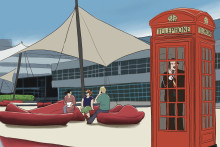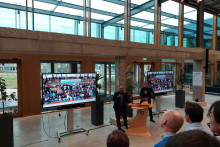English as a formal language and where possible, but keep on talking Dutch at the coffee machine, that is the current UT language policy in a nutshell. But Arend Rensink, program director at Computer Science, asks more of his teachers and students. He recently sent his own guidelines to them. ‘My experience is that not everyone is aware of how we approach each other and where things go wrong,’ he says. ‘My position is that we are a fully English-speaking university. It is fitting that we speak English to each other, so that people can participate in a conversation at any time.’
No language police
The consequence of the new guideline is that students in, for example, working groups speak English, even if that group consists of Dutch people only. ‘The point is that we should not look around us to see if there are other nationalities in the room. We should always and intrinsically speak English to each other,’ says Rensink. ‘Of course I will not be there to check and there will not be a language police either. I outline an ideal in this guideline. In addition, I know very well that exceptions will occur. But the general message stands.’
Faculty council has questions
The faculty council of EEMCS is divided about the code of conduct at Computer Science and will have a discussion with Dean Joost Kok, says board member Sebastiaan Joosten. ‘Some of the members completely agree with the idea behind the code, but there are also question marks about the sharp edges. Because in practice you will of course not check if people speak Dutch at the coffee machine. We were unable to reach a consensus in our meeting. We have therefore decided to discuss this code of conduct with Dean Joost Kok.’
Rensink is continuing his language policy. ‘International students have said on several occasions that they feel excluded or disadvantaged,’ he says. ‘That can happen because of very trivial things. For example, in the past we offered several test exams in Dutch and we translated one into English. You think: we are doing well. But the internationals rightly feel disadvantaged. They only have one practice exam. At first I was not aware of that either. That is why I think we should be more explicit in our language policy.’






